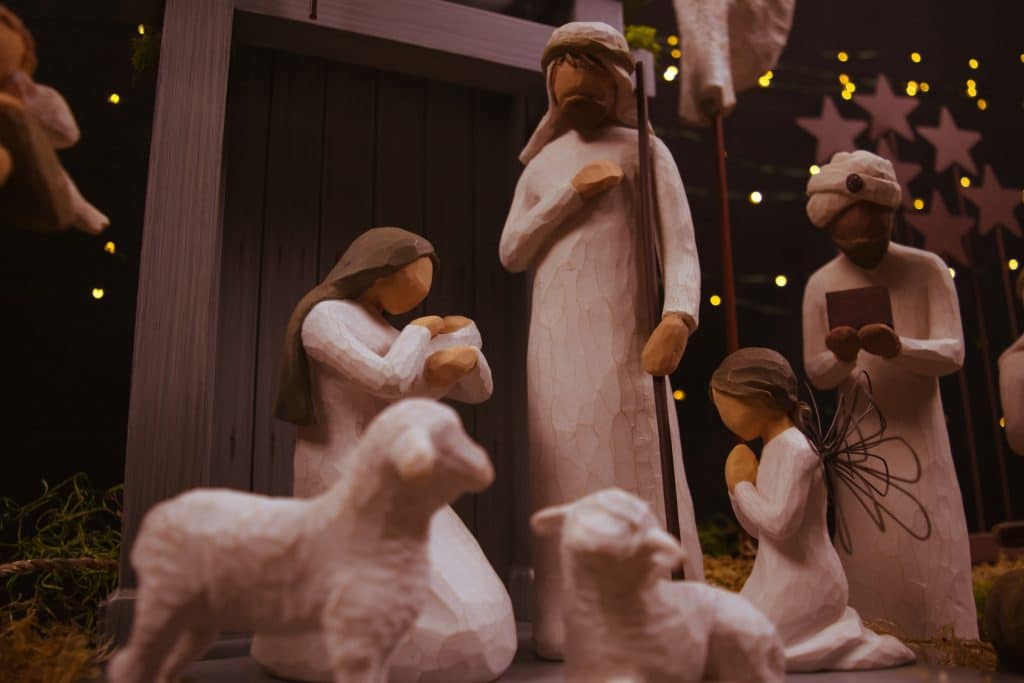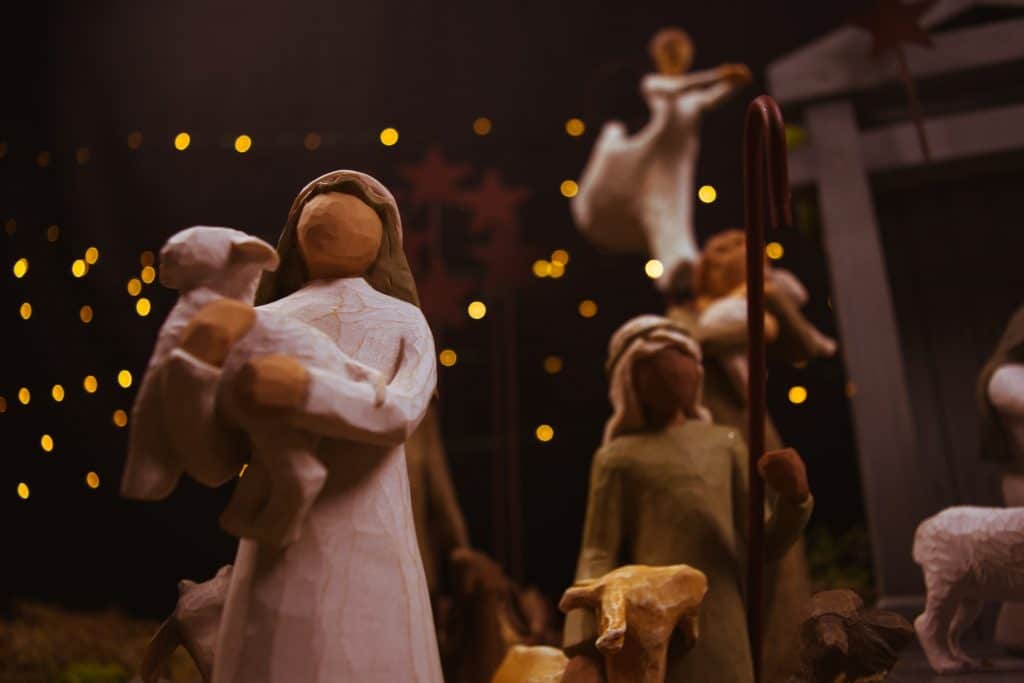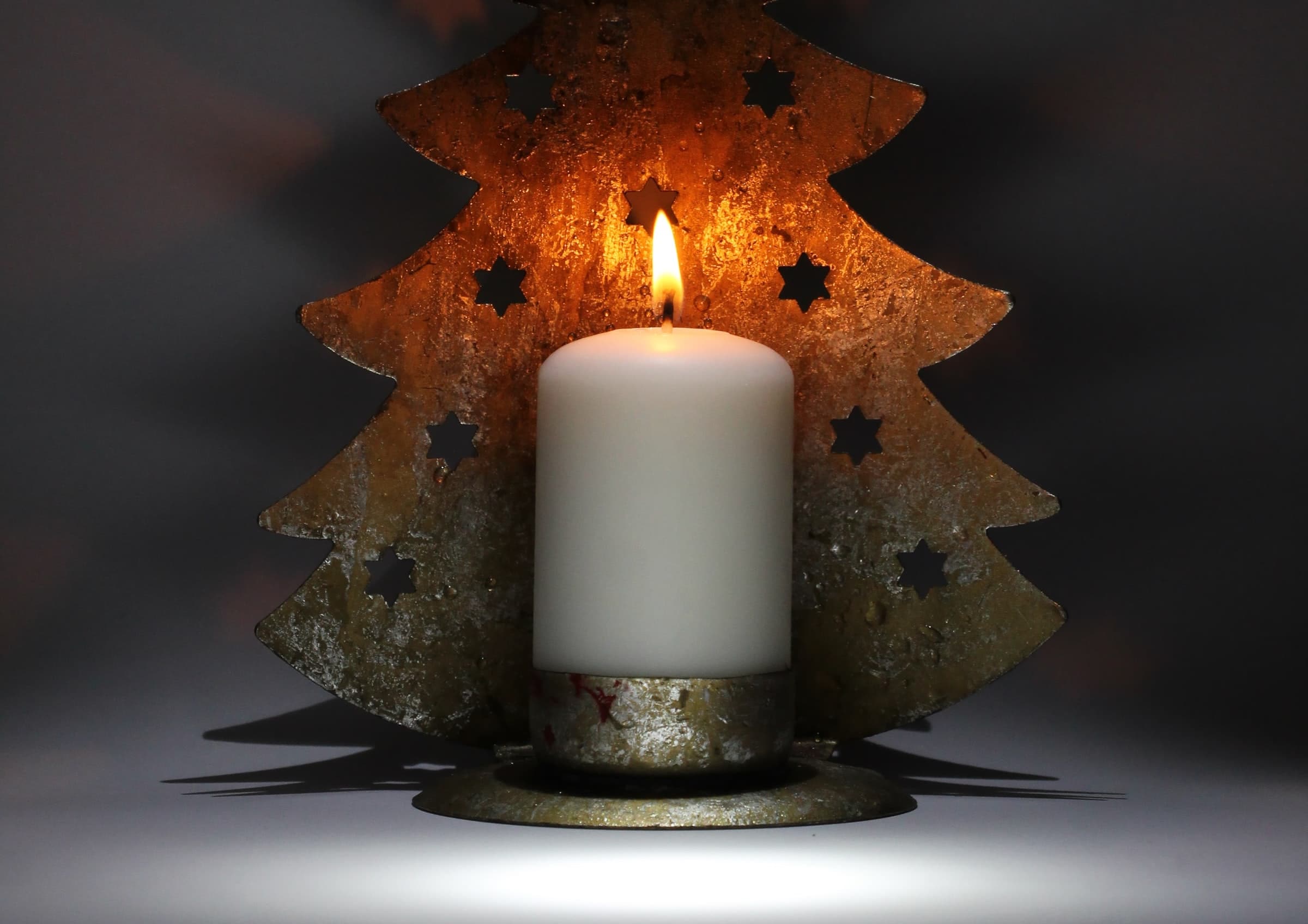Christmas seems especially surreal to a lot of people this year. But after thinking about it awhile, I realized that Christmas has always seemed a little surreal to me.
I didn’t grow up in the church, and I didn’t start following Jesus until I was 20, so in that time, I’ve observed a change in how I view Christmas.
As a kid, Christmas is a complete break from routine. No school, people give you presents, you find out that there is some stranger who lives in the North Pole who sees you when you’re sleeping and knows when you’re awake…and, for whatever reason, it doesn’t freak you out. For the first ten years of my life, there was some mystery to it all. And we love that about Christmas.
But the next ten years, if you aren’t part of a church, there is understandably a time of disillusionment. I remember thinking, this is weird, why are we doing this? Christmas was still a complete break from routine. No school, people still give you presents, and you find out that there really is some stranger who sees you when you’re sleeping and knows when you’re awake; they are just headquartered in Washington, D. C. And they also now work for Facebook and Amazon. But for me, the mystery of Christmas just seemed to dissipate in those years.
Then, I turned 20. And this Jesus person grabbed my heart and turned my life on its head. And Christmas became kind of mysterious again.
The Christmas stories seem surreal, even confusing, almost like it is some kind of fantasy world. Special stars are appearing in the sky? Angels? A virgin giving birth? A baby that is God? Or what about Christmas hymns even? I would bet that some of us still don’t know what some of the words mean even as we sing them.
John Beukema tells the story of a little girl that came home from Sunday school waving a paper for her mother to see. “Look, Mommy,” she exclaimed, “teacher says I drew the most unusual Christmas picture she ever saw!” Her mother took one look at the drawing and had to agree with the teacher. Hoping her daughter could explain her creation, the mother asked, “Why are all these people riding in the back of an airplane?”
“Well, Mommy, that’s the flight into Egypt.”
Accepting that, the mother asked another question: “Who is this mean-looking man in the front?”
Her daughter answered quickly and knowingly: “That’s Pontius, the Pilot.”
Looking at the drawing even more closely, the mother said, “I see you have Mary and Joseph and the baby. But who is this large man sitting behind Mary?”
“Can’t you tell?” the little girl asked, beginning to shake her head in disappointment. “That’s Round John Virgin.”
It’s funny, but that’s just the kind of thing that I am talking about. We sing “Silent Night” almost every Christmas in church, and I can’t tell you how many people have no idea what “Round yon virgin” means. It’s actually tied to the prior verse. “All is calm, all is bright, round yon…” It’s essentially “round yonder,” or “around” the virgin mother and child. All is calm and bright around the mother and child.
Christmas details like this are important, because when we look at Luke 2:1-10, we have to understand that Luke gets that the story he is about to tell might seem surreal to his readers. And it’s for that reason that when he crafts this particular piece of folk poetry, he adds specific details. He wants to show us how masterful God’s plan is in the world.
But Luke also gets something that we as modern people tend to miss: the whole world is already surreal.
N.D. Wilson writes:
“The world that we live in is fundamentally at odds with human self-importance. Mountains have no guardrails. County officials can ban spitting fireworks, but meteorites go unregulated. Clouds drench us whenever they like without fear of reprisal. Winds cheerfully vandalize and even demolish buildings that were appropriately permitted and approved. Birds fly. Tadpoles spout legs and belch through the night regardless of noise ordinances. Monkeys are for real. So is what they fling.

“God’s personality – his fingerprints [are all over the world] and they won’t wipe off. His incredible, untamable, transcendent personality is everywhere. [So] Christians, who believe that the world is God’s and is good, don’t need to subtract the supernatural or escape our boring world. Indeed, we need to see fantasy in the tides and the spring, in childbirth, and love and sweat, in eyeballs that see and tongues that taste, in the blazing star above us and the forests grown with its energy, rustling in the wind.”
I’d add, “in pandemics… In the abnormal.”
“Our stories and philosophies should help widen our eyes to the glorious personality of our [God]. We are here, in a place where words are made flesh all around us, where dragonflies dart like living metallic origami, while kids jump off docks into liquid. Where the word Himself was made flesh… The real is fantasy.”
Luke understands this and seeks to convey that God is not regulated, particularly not by humanity.
Luke’s very first line of the birth narrative mentions Caesar Augustus and the fact that he was trying to, in essence, regulate and order the entire Roman Empire by taking a census. But God is about to enter the scene and totally disrupt this order. And the significance of this point cannot be understated.
As far as Roman emperors go, Caesar Augustus was actually pretty well liked. He was the great-nephew of Julius Caesar and almost the complete opposite of the Emperor Nero who would come after him and persecute Christians fiercely. Augustus is known throughout the world for his establishment of the Pax Romana (the Roman Peace), a long period of relative peace and minimal expansion by military force that lasted 206 years. Luke’s first readers would have known this fact about Augustus because the Pax Romana is so attributed to him that sometimes it was even referred to as the Pax Augusta. But Luke understands that this is a human peace and not the peace of God. When the angels sing in verse 14, “Glory to God in the highest and on earth peace to his people on whom his favor rests,” Luke is drawing the distinction between the Pax Romana and the Hebrew understanding of peace. Peace in Hebrew does not mean merely freedom from trouble; it means all that makes for man’s highest good. And Luke is contrasting that now, through Christ, man will be enabled to walk in the ways that lead to everything that means life, not toward death.

More than that, Luke is trying to make a larger point. God is even using Augustus for his plans. In the Old Testament, in Micah 5:2, the prophet Micah had declared that the Messiah would be born in Bethlehem. Had the census not been called, Mary would have delivered in Nazareth. But because of the census, Mary and Joseph made the 80-mile trek to Bethlehem, and Luke is insisting this is no accident. God knows the details of Augustus’ actions generations before he takes them. Luke is saying God’s order will be the order that prevails.
And this order is the opposite of what we might make it. This order will put the very the least first. This order will exalt humility and innocence. This order will start in servitude and poverty.
Theodotus of Ancyra, a martyred saint from the 4th century, once wrote on what he thought was the reason for Jesus coming into the world in such poverty: “The Lord of all comes as a slave amidst poverty… Choosing for his birthplace an unknown village in a remote province, he is born of a poor maiden and accepts all that poverty implies, for he hopes by stealth to ensnare and save us.
“If he had been born to high rank and amidst luxury, unbelievers would have said the world had been transformed by wealth. If he had chosen as his birthplace the great city of Rome, they would have thought the transformation had been brought about by civil power. Suppose he had been the son of an emperor. They would have said: ‘How useful it is to be powerful!’ Imagine him the son of a senator. It would have been: ‘Look what can be accomplished by legislation!’
“But in fact, what did he do? He chose surroundings that were poor and simple, so ordinary as to be almost unnoticed, so that people would know it was the Godhead alone that had changed the world. This was his reason for choosing his mother from among the poor of a very poor country, and for becoming poor himself.”
Luke is clear: God is starting his rescue mission of humanity this night, and the world will never be the same. God is orchestrating a different way, a different order to the world.

And so out of another dimension, an angel — a messenger of the Lord shining bright with the glory of God — appears to shepherds at night. (You can imagine how if an angel just appeared hovering in the place you are right now, you’d probably be freaking out.) And the first thing he says is, “Do not be afraid,“ or “Fear not!” He then gives the proclamation of Jesus’ birth to the shepherds. And then, coming from the depths of the invisible world of celestial beings, there is at once a great host, an army of angels, who join in song singing praise: “Gloria in excelsis Deo, glory to God in the highest!”
And even this song is a sign of God’s great orchestration. You see, if Mary had given birth to Jesus in Nazareth where they lived, the local musicians there would have congregated at her house to greet the child with simple music. This was the custom of the time. But since Jesus was born in a stable in Bethlehem, that ceremony couldn’t be carried out. Yet in heaven, the armies of angels rejoice as the child who will bring about this new order of heaven and earth is born, and they peek through into this world to share that jubilation with the lowly shepherds.
So you see, when we sing these songs of welcome in worship, we too are joining the singing of this world with the very singing of heaven.
We also have to understand it is a big deal that God chose shepherds as the first people to visit Jesus. Shepherds in Jesus’ day were actually despised by the orthodox Jews because they were unable to keep the details of the ceremonial law; they couldn’t observe the meticulous hand washings and the proper rules and regulations because their flocks made constant demands on them. So they were looked down upon as very common people. And biblical scholars tell us that these particular shepherds whom the angels approach were probably ridiculed most of all because of their proximity to the Temple. They were likely the keepers of the private lambs that were used as sacrifices by Temple authorities. This means that these particular shepherds would have regularly found themselves being condemned right to their faces as the Temple authorities came to pick out unblemished lambs for sacrifice. So these shepherds were considered some of the lowest people in the region — even considered unreligious — and God invites them to the birth of Jesus.
Faye Grubb tells a story about her granddaughter sharing the Christmas story with her children. She explained how there was no room at the inn, so Mary and Joseph had to stay in the stable. She then asked, “Does anyone remember what Mary had?” Her 4-year-old son Lincoln blurted out, “Mary had a little lamb!” It’s funny, but actually his confusion highlights a great biblical truth.
Mary did have a little lamb. And it’s a pretty amazing thought that shepherds who looked after the Temple lambs were the first to see the Lamb of God who takes away the sin of the world.
God is making a statement here. He will forget no one. Not you, not me, not anyone. He will reach through the very dimensions of time and space in order to redeem His creation. He will overcome the misled ordering of humankind. He will bring about His justice and His peace and His reconciliation.
The famed theologian N.T. Wright tells us that Christmas changes everything. Wright says that it is a gross misunderstanding that heaven and earth are somehow completely separate spheres, because actually, they are interlocking and ever interlocking more fully. And the foundational point of this interlocking starts with this baby, Jesus, fully human and fully God. He is of both heaven and earth.

Jesus invites us, wherever we are in this life, to actively participate in bringing about the renewal and restoration of humanity and earth. We are not called to be passive observers, folks. We are called to seek out and do the things that that bring about God’s will on earth as it is in heaven.
So understand that when we rejoice together in song, when we join together in prayer, when we study and meditate on the details of God’s Word and hear it proclaimed, when we serve others, when we bring about justice in the world, when we worship together, when we light candles together to renew our awareness, when actively seek to reconcile our relationships , we — you and me — join heaven — through Jesus — to earth.
Because of everything that has been going on this year, maybe some of you have been thinking about Christmas like I used to, that it has somehow become disenchanted. If that’s you, I want to encourage you today, in this moment, to dare to look at the world differently than you ever have before. Dare to participate in Christmas — Christ’s Mass, “Christ’s Mission” to the world. Dare to envision what is beyond your sight. Embrace the surreal. Look at our world as it is ever growing in the supernatural. Observe God’s fingerprints all over it. Delight in God’s personality, in the care God has put into His creation. See that care in our world, in our community, in your church, in your family, in the eyes of a newborn child, and rejoice! For God is with us.
Reality Changing Observations:
1. What aspects of life seem surreal compared to others, and why?
2. How does understanding reality as fantastic change our understanding of who we are as humans and what is possible?
3. How do you believe that are you called to practically better the world?





